Written by Angeline A. De Leon. A study of 842,120 HPV-vaccinated girls suggests that HPV vaccination exposure is not linked to autoimmune disease; however, a causal relationship may exist between HPV vaccination and the development of Guillain-Barre Syndrome.
 Human Papillomavirus (HPV) is the most commonly sexually transmitted infection, with more than 100 varieties affecting both men and women. Although many with the condition will not develop any symptoms, primarily involving the development of warts in various parts of the body, HPV itself is incurable and remains highly contagious 1. Certain types of HPV, known as high-risk HPV, can also cause cervical and other types of cancer (anus, oral cavity, etc.), which in recent years has prompted the establishment of new large-scale vaccinations among the general population 2. For example, by the end of 2015, vaccinations against HPV numbered over 80 million among girls worldwide 3. Current HPV vaccines target the prevention of genital cancers and genital warts, the two primary forms being Gardasil and Cervarix, and although generally effective, some epidemiological studies report a potential link between HPV vaccination and increased risk of autoimmune diseases such as Guillain-Barre Syndrome (GBS) and Multiple Sclerosis (MS) 4. Other case-control studies, however, do not support findings regarding HPV as a risk factor for autoimmune disease 5. To determine the nature of the relationship between exposure to HPV vaccines and risk of autoimmune disease, a 2017 study published in Vaccine conducted a large cohort study of over 2 million young girls examining whether HPV vaccination might induce autoimmune disease.
Human Papillomavirus (HPV) is the most commonly sexually transmitted infection, with more than 100 varieties affecting both men and women. Although many with the condition will not develop any symptoms, primarily involving the development of warts in various parts of the body, HPV itself is incurable and remains highly contagious 1. Certain types of HPV, known as high-risk HPV, can also cause cervical and other types of cancer (anus, oral cavity, etc.), which in recent years has prompted the establishment of new large-scale vaccinations among the general population 2. For example, by the end of 2015, vaccinations against HPV numbered over 80 million among girls worldwide 3. Current HPV vaccines target the prevention of genital cancers and genital warts, the two primary forms being Gardasil and Cervarix, and although generally effective, some epidemiological studies report a potential link between HPV vaccination and increased risk of autoimmune diseases such as Guillain-Barre Syndrome (GBS) and Multiple Sclerosis (MS) 4. Other case-control studies, however, do not support findings regarding HPV as a risk factor for autoimmune disease 5. To determine the nature of the relationship between exposure to HPV vaccines and risk of autoimmune disease, a 2017 study published in Vaccine conducted a large cohort study of over 2 million young girls examining whether HPV vaccination might induce autoimmune disease.
Using French nationwide databases, a longitudinal observational study was carried out between January 2008 and December 2013 using a sample of 2,252,716 girls (aged 13-16 years) without a history of HPV vaccination or autoimmune disease. During the study period, HPV vaccination was advised for girls aged at least 14 years old (since July 2007 and July 2008), and those who received a vaccination were considered as exposed from the date of their first vaccine dose until the end of study follow-up. Fourteen types of autoimmune disease were evaluated based on criteria involving symptoms of neurological, rheumatological, hematological, endocrine, and/or gastro-intestinal disorders. Incidence of autoimmune disease was then compared between girls exposed to HPV vaccination and those non-exposed.
During a mean follow-up time of 33 months, 37% of subjects (842,120) received HPV vaccination and 4,096 cases of AID were reported. Prevalence of autoimmune disease was not found to be increased after vaccine exposure, except in the case of GBS (adjusted Hazard Ratio = 3.78, 95% Confidence Interval: 1.79 to 7.98, p < 0.01). Among the 19 exposed GBS cases, 78.9% (15) received at least 2 doses of the HPV vaccine and 52.6% (10) had received 3 doses. Median time of GBS onset from time of vaccine exposure was 4.6 months. Under the assumption of a causal relationship, findings imply that for every 100,000 girls vaccinated, 1-2 cases of GBS would be attributable to HPV vaccination.
Based on findings in a cohort of more than two million young girls, the present study suggests that exposure to HPV vaccination is not generally linked to the development of autoimmune disease. The occurrence of GBS, however, may be exempt from this, and results indicate that GBS risk is possibly increased following vaccination, typically developing in the first few months after the first dose. Further studies are needed to validate this finding, but overall data do not support HPV vaccination as a risk factor for autoimmune disease.
Source: Miranda S, Chaignot C, Collin C, et al. Human papillomavirus vaccination and risk of autoimmune diseases: A large cohort study of over 2 million young girls in France. Vaccine. 2017; 35:4761-4768. DOI: 10.1016/j.vaccine.2017.06.030.
© 2017 The Authors. Published by Elsevier Ltd. This is an open access article under the CC BY-NC-NDlicense (http://creativecommons.org/licenses/by-nc-nd/4.0/)
Click here to read the full text study.
Posted May 18, 2018.
References:
- Vichnin M, Bonanni P, Klein NP, et al. An overview of quadrivalent human papillomavirus vaccine safety – 2006 to 2015. Pediatr Infect Dis J. 2015.
- Geier DA, Geier MR. A case-control study of quadrivalent human papillomavirus vaccine-associated autoimmune adverse events. Clin Rheumatol. 2015; 34(7): 1225-1231.
- European Medicines Agency. EMA confirms evidence does not support that they cause CRPS or POTS. Eur Med Agency; 2015.
- Dieleman J, Romio S, Johansen K, et al. Guillain-Barre syndrome and adjuvanted pandemic influenza A (H1N1) 2009 vaccine: multinational case-control study in Europe. BMJ. 2011; 343: d3908.
- Grimaldi-Bensouda 5L, Guillemot D, Godeau B, et al. Autoimmune disorders and quadrivalent human papillomavirus vaccination of young female subjects. J Intern Med. 2014; 275(4): 398-408.

